Karen Lynn Allen's Blog, page 9
December 7, 2011
I Am in Love with Ulysses S. Grant
@font-face { font-family: "Cambria";}p.MsoNormal, li.MsoNormal, div.MsoNormal { margin: 0in 0in 0.0001pt; font-size: 12pt; font-family: "Times New Roman"; }div.Section1 { page: Section1; }
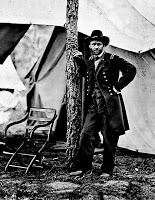 The ManI realize this infatuation may only be a passing fancy, but Ihave begun reading the memoirs of Ulysses S. Grant. It is a two-volume set, consisting of 552 pages (althoughI'm reading it on a Kindle which results in never having a true feel for whereyou are in a book.) In any event, I've set out on a journey to plumb this man'ssoul. It's nice to have a long read to look forward to.
The ManI realize this infatuation may only be a passing fancy, but Ihave begun reading the memoirs of Ulysses S. Grant. It is a two-volume set, consisting of 552 pages (althoughI'm reading it on a Kindle which results in never having a true feel for whereyou are in a book.) In any event, I've set out on a journey to plumb this man'ssoul. It's nice to have a long read to look forward to.
Grant wrote these memoirs at the very end of his life, as hewas dying of throat cancer. Seems to me a meaningful vantage point from whichto ponder one's place in history. A man of humble beginnings, Grant hadenormous successes and enormous failures. Some of these would alter the fate ofa nation; others the fate of a people. Some brought him shame and financialruin.
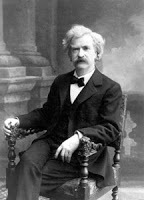 Grant BoosterMark Twain characterized Grant's account as "a great, uniqueand unapproachable literary masterpiece," a war memoir comparable in stature toJulius Caesar's. (There'shyperbole for you, to be expected since Twain was involved in publishing andselling the book.) Fifty years later, holding court underneath her Picasso's,Gertrude Stein claimed Grant's book to be one of the greatest written by anAmerican. Walt Whitman said of Grant, "In all Homer and Shakespeare there is nofortune or personality really more picturesque or rapidly changing, more fullof heroism, pathos, contrast." (I cannot resist also including this quotefrom Whitman, just because it makes me smile: "I do not value literatureas a profession. I feel about literature what Grant did about war. He hatedwar. I hate literature.")
Grant BoosterMark Twain characterized Grant's account as "a great, uniqueand unapproachable literary masterpiece," a war memoir comparable in stature toJulius Caesar's. (There'shyperbole for you, to be expected since Twain was involved in publishing andselling the book.) Fifty years later, holding court underneath her Picasso's,Gertrude Stein claimed Grant's book to be one of the greatest written by anAmerican. Walt Whitman said of Grant, "In all Homer and Shakespeare there is nofortune or personality really more picturesque or rapidly changing, more fullof heroism, pathos, contrast." (I cannot resist also including this quotefrom Whitman, just because it makes me smile: "I do not value literatureas a profession. I feel about literature what Grant did about war. He hatedwar. I hate literature.")
Of course not everyone was a fan of the man. Henry Jamessniffed that Grant's prose was "hard and dry as sandpaper." Matthew Arnold heldthat Grant's use of English was "without charm and without high breeding." But let them say what they like. Dyingand nearly destitute, Grant clung to life and churned out up to fifty pages aday so that profits from the book might provide for his family. He finished themanuscript and died five days later.
A curious man. I am in love with his voice. It wasanti-Victorian, not flowery and verbose but spare, direct, even acerbic. Yet not cynical, at least not by modern standards. The amusement and wit is gentler, forgiving, and always demonstrating a clarity and intelligence that I admire.
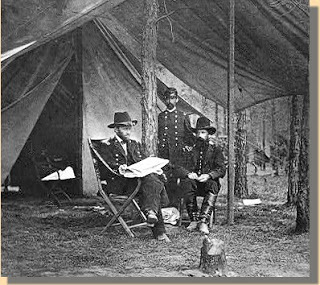 At his best?They say Grant had great courage and coolness under fire. Itcertainly showed during the Battle of Fort Donelson. It was while researching theperformance of Gideon Pillow (perhaps the worst general in the Civil War) in thatbattle that I first ran across Grant's wry recollections. It was no doubt whatset me on a course, six months later, to delve into his memoirs.
At his best?They say Grant had great courage and coolness under fire. Itcertainly showed during the Battle of Fort Donelson. It was while researching theperformance of Gideon Pillow (perhaps the worst general in the Civil War) in thatbattle that I first ran across Grant's wry recollections. It was no doubt whatset me on a course, six months later, to delve into his memoirs.
My question at the moment: how does an aware, intelligentman of his caliber, a great strategist and imperturbable tactician (unruffled by bolting horses or bullets flying overhead), make suchastonishing, bonehead errors of judgment? His presidency was one of the mostcorrupt on record, and some of the worst excesses of the Reconstructionhappened on his watch. He went on to end his life in financial ruin due to laxoversight and further poor judgment. And yet he says this about theMexican-American War (with which I am in complete agreement):
"I was bitterly opposed to the measure, and to this dayregard the war, which resulted, as one of the most unjust ever waged by astronger against a weaker nation. It was an instance of a republic followingthe bad example of European monarchies, in not considering justice in theirdesire to acquire additional territory."
I cannot but believe Grant was a moral man. Moral in, Isuppose, my complex, rather torturous definition of the term. (You have to seeall the complexities, the good and the bad, the dark and the light, and all themurky grey areas in between where things are never clear and people try andfail, and maybe don't try so hard and fail but have to be forgiven anywaybecause, in the end, kindness is the only true religion. And with all this,knowing the tragedies and the pettiness and the failures and the sadness,knowing your own failures and the reefs you've foundered on, you still mostdays attempt the right thing, that which will cause the least suffering and mostwell-being for all. You strive for what your conscience can best live with, because there is, inthe end, no other choice. And if you can do all this without bitterness, witheven a sense of humor, by god, you're a saint.)
(I have not often managed to live up to this definition.)

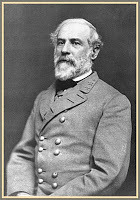 I wish Lincoln had lived to write his autobiography. Hecould be hysterically funny and I'm sure such a book would be a rollicking goodtime (not unlike Benjamin Franklin's autobiography which is a hoot.) I'm also a fan of Robert E Lee and wishhe'd written memoirs so I could hear his voice without all the mythologizingand interpreters, though in his writing Lee is invariably such a gentleman andso circumspect that perhaps little of his inner personality might have shownthrough.
I wish Lincoln had lived to write his autobiography. Hecould be hysterically funny and I'm sure such a book would be a rollicking goodtime (not unlike Benjamin Franklin's autobiography which is a hoot.) I'm also a fan of Robert E Lee and wishhe'd written memoirs so I could hear his voice without all the mythologizingand interpreters, though in his writing Lee is invariably such a gentleman andso circumspect that perhaps little of his inner personality might have shownthrough.
 But what is left to posterity, mostly due to a pressing needfor cash, is the account of a man who, as a West Point cadet, just wanted to becomea math professor and who probably would've been happier, when all was said anddone, had that happened. But his soul, his demons, his moral center? Does thearc of the universe indeed bend towards justice, kindness, redemption? Ah,that's why I read. And why I write. To find out.
But what is left to posterity, mostly due to a pressing needfor cash, is the account of a man who, as a West Point cadet, just wanted to becomea math professor and who probably would've been happier, when all was said anddone, had that happened. But his soul, his demons, his moral center? Does thearc of the universe indeed bend towards justice, kindness, redemption? Ah,that's why I read. And why I write. To find out.
 The ManI realize this infatuation may only be a passing fancy, but Ihave begun reading the memoirs of Ulysses S. Grant. It is a two-volume set, consisting of 552 pages (althoughI'm reading it on a Kindle which results in never having a true feel for whereyou are in a book.) In any event, I've set out on a journey to plumb this man'ssoul. It's nice to have a long read to look forward to.
The ManI realize this infatuation may only be a passing fancy, but Ihave begun reading the memoirs of Ulysses S. Grant. It is a two-volume set, consisting of 552 pages (althoughI'm reading it on a Kindle which results in never having a true feel for whereyou are in a book.) In any event, I've set out on a journey to plumb this man'ssoul. It's nice to have a long read to look forward to. Grant wrote these memoirs at the very end of his life, as hewas dying of throat cancer. Seems to me a meaningful vantage point from whichto ponder one's place in history. A man of humble beginnings, Grant hadenormous successes and enormous failures. Some of these would alter the fate ofa nation; others the fate of a people. Some brought him shame and financialruin.
 Grant BoosterMark Twain characterized Grant's account as "a great, uniqueand unapproachable literary masterpiece," a war memoir comparable in stature toJulius Caesar's. (There'shyperbole for you, to be expected since Twain was involved in publishing andselling the book.) Fifty years later, holding court underneath her Picasso's,Gertrude Stein claimed Grant's book to be one of the greatest written by anAmerican. Walt Whitman said of Grant, "In all Homer and Shakespeare there is nofortune or personality really more picturesque or rapidly changing, more fullof heroism, pathos, contrast." (I cannot resist also including this quotefrom Whitman, just because it makes me smile: "I do not value literatureas a profession. I feel about literature what Grant did about war. He hatedwar. I hate literature.")
Grant BoosterMark Twain characterized Grant's account as "a great, uniqueand unapproachable literary masterpiece," a war memoir comparable in stature toJulius Caesar's. (There'shyperbole for you, to be expected since Twain was involved in publishing andselling the book.) Fifty years later, holding court underneath her Picasso's,Gertrude Stein claimed Grant's book to be one of the greatest written by anAmerican. Walt Whitman said of Grant, "In all Homer and Shakespeare there is nofortune or personality really more picturesque or rapidly changing, more fullof heroism, pathos, contrast." (I cannot resist also including this quotefrom Whitman, just because it makes me smile: "I do not value literatureas a profession. I feel about literature what Grant did about war. He hatedwar. I hate literature.")Of course not everyone was a fan of the man. Henry Jamessniffed that Grant's prose was "hard and dry as sandpaper." Matthew Arnold heldthat Grant's use of English was "without charm and without high breeding." But let them say what they like. Dyingand nearly destitute, Grant clung to life and churned out up to fifty pages aday so that profits from the book might provide for his family. He finished themanuscript and died five days later.
A curious man. I am in love with his voice. It wasanti-Victorian, not flowery and verbose but spare, direct, even acerbic. Yet not cynical, at least not by modern standards. The amusement and wit is gentler, forgiving, and always demonstrating a clarity and intelligence that I admire.
 At his best?They say Grant had great courage and coolness under fire. Itcertainly showed during the Battle of Fort Donelson. It was while researching theperformance of Gideon Pillow (perhaps the worst general in the Civil War) in thatbattle that I first ran across Grant's wry recollections. It was no doubt whatset me on a course, six months later, to delve into his memoirs.
At his best?They say Grant had great courage and coolness under fire. Itcertainly showed during the Battle of Fort Donelson. It was while researching theperformance of Gideon Pillow (perhaps the worst general in the Civil War) in thatbattle that I first ran across Grant's wry recollections. It was no doubt whatset me on a course, six months later, to delve into his memoirs. My question at the moment: how does an aware, intelligentman of his caliber, a great strategist and imperturbable tactician (unruffled by bolting horses or bullets flying overhead), make suchastonishing, bonehead errors of judgment? His presidency was one of the mostcorrupt on record, and some of the worst excesses of the Reconstructionhappened on his watch. He went on to end his life in financial ruin due to laxoversight and further poor judgment. And yet he says this about theMexican-American War (with which I am in complete agreement):
"I was bitterly opposed to the measure, and to this dayregard the war, which resulted, as one of the most unjust ever waged by astronger against a weaker nation. It was an instance of a republic followingthe bad example of European monarchies, in not considering justice in theirdesire to acquire additional territory."
I cannot but believe Grant was a moral man. Moral in, Isuppose, my complex, rather torturous definition of the term. (You have to seeall the complexities, the good and the bad, the dark and the light, and all themurky grey areas in between where things are never clear and people try andfail, and maybe don't try so hard and fail but have to be forgiven anywaybecause, in the end, kindness is the only true religion. And with all this,knowing the tragedies and the pettiness and the failures and the sadness,knowing your own failures and the reefs you've foundered on, you still mostdays attempt the right thing, that which will cause the least suffering and mostwell-being for all. You strive for what your conscience can best live with, because there is, inthe end, no other choice. And if you can do all this without bitterness, witheven a sense of humor, by god, you're a saint.)
(I have not often managed to live up to this definition.)

 I wish Lincoln had lived to write his autobiography. Hecould be hysterically funny and I'm sure such a book would be a rollicking goodtime (not unlike Benjamin Franklin's autobiography which is a hoot.) I'm also a fan of Robert E Lee and wishhe'd written memoirs so I could hear his voice without all the mythologizingand interpreters, though in his writing Lee is invariably such a gentleman andso circumspect that perhaps little of his inner personality might have shownthrough.
I wish Lincoln had lived to write his autobiography. Hecould be hysterically funny and I'm sure such a book would be a rollicking goodtime (not unlike Benjamin Franklin's autobiography which is a hoot.) I'm also a fan of Robert E Lee and wishhe'd written memoirs so I could hear his voice without all the mythologizingand interpreters, though in his writing Lee is invariably such a gentleman andso circumspect that perhaps little of his inner personality might have shownthrough. But what is left to posterity, mostly due to a pressing needfor cash, is the account of a man who, as a West Point cadet, just wanted to becomea math professor and who probably would've been happier, when all was said anddone, had that happened. But his soul, his demons, his moral center? Does thearc of the universe indeed bend towards justice, kindness, redemption? Ah,that's why I read. And why I write. To find out.
But what is left to posterity, mostly due to a pressing needfor cash, is the account of a man who, as a West Point cadet, just wanted to becomea math professor and who probably would've been happier, when all was said anddone, had that happened. But his soul, his demons, his moral center? Does thearc of the universe indeed bend towards justice, kindness, redemption? Ah,that's why I read. And why I write. To find out.
Published on December 07, 2011 20:10
I am in Love with Ulysses S. Grant
@font-face { font-family: "Cambria";}p.MsoNormal, li.MsoNormal, div.MsoNormal { margin: 0in 0in 0.0001pt; font-size: 12pt; font-family: "Times New Roman"; }div.Section1 { page: Section1; }
 The ManI realize this infatuation may only be a passing fancy, but Ihave begun reading the memoirs of Ulysses S. Grant. It is a two-volume set, consisting of 552 pages (althoughI'm reading it on a Kindle which results in never having a true feel for whereyou are in a book.) In any event, I've set out on a journey to plumb this man'ssoul. It's nice to have a long read to look forward to.
The ManI realize this infatuation may only be a passing fancy, but Ihave begun reading the memoirs of Ulysses S. Grant. It is a two-volume set, consisting of 552 pages (althoughI'm reading it on a Kindle which results in never having a true feel for whereyou are in a book.) In any event, I've set out on a journey to plumb this man'ssoul. It's nice to have a long read to look forward to.
Grant wrote these memoirs at the very end of his life, as hewas dying of throat cancer. Seems to me a meaningful vantage point from whichto ponder one's place in history. A man of humble beginnings, Grant hadenormous successes and enormous failures. Some of these would alter the fate ofa nation; others the fate of a people. Some brought him shame and financialruin.
 Grant BoosterMark Twain characterized Grant's account as "a great, uniqueand unapproachable literary masterpiece," a war memoir comparable in stature toJulius Caesar's. (There'shyperbole for you, to be expected since Twain was involved in publishing andselling the book.) Fifty years later, holding court underneath her Picasso's,Gertrude Stein claimed Grant's book to be one of the greatest written by anAmerican. Walt Whitman said of Grant, "In all Homer and Shakespeare there is nofortune or personality really more picturesque or rapidly changing, more fullof heroism, pathos, contrast." (I cannot resist also including this quotefrom Whitman, just because it makes me smile: "I do not value literatureas a profession. I feel about literature what Grant did about war. He hatedwar. I hate literature.")
Grant BoosterMark Twain characterized Grant's account as "a great, uniqueand unapproachable literary masterpiece," a war memoir comparable in stature toJulius Caesar's. (There'shyperbole for you, to be expected since Twain was involved in publishing andselling the book.) Fifty years later, holding court underneath her Picasso's,Gertrude Stein claimed Grant's book to be one of the greatest written by anAmerican. Walt Whitman said of Grant, "In all Homer and Shakespeare there is nofortune or personality really more picturesque or rapidly changing, more fullof heroism, pathos, contrast." (I cannot resist also including this quotefrom Whitman, just because it makes me smile: "I do not value literatureas a profession. I feel about literature what Grant did about war. He hatedwar. I hate literature.")
Of course not everyone was a fan of the man. Henry Jamessniffed that Grant's prose was "hard and dry as sandpaper." Matthew Arnold heldthat Grant's use of English was "without charm and without high breeding." But let them say what they like. Dyingand nearly destitute, Grant clung to life and churned out up to fifty pages aday so that profits from the book might provide for his family. He finished themanuscript and died five days later.
A curious man. I am in love with his voice. It wasanti-Victorian, not flowery and verbose but spare, direct, even acerbic. Yet not cynical, at least not by modern standards. The amusement and wit is gentler, forgiving, and always demonstrating a clarity and intelligence that I admire.
 At his best?They say Grant had great courage and coolness under fire. Itcertainly showed during the Battle of Fort Donelson. It was while researching theperformance of Gideon Pillow (perhaps the worst general in the Civil War) in thatbattle that I first ran across Grant's wry recollections. It was no doubt whatset me on a course, six months later, to delve into his memoirs.
At his best?They say Grant had great courage and coolness under fire. Itcertainly showed during the Battle of Fort Donelson. It was while researching theperformance of Gideon Pillow (perhaps the worst general in the Civil War) in thatbattle that I first ran across Grant's wry recollections. It was no doubt whatset me on a course, six months later, to delve into his memoirs.
My question at the moment: how does an aware, intelligentman of his caliber, a great strategist and imperturbable tactician (unruffled by bolting horses or bullets flying overhead), make suchastonishing, bonehead errors of judgment? His presidency was one of the mostcorrupt on record, and some of the worst excesses of the Reconstructionhappened on his watch. He went on to end his life in financial ruin due to laxoversight and further poor judgment. And yet he says this about theMexican-American War (with which I am in complete agreement):
"I was bitterly opposed to the measure, and to this dayregard the war, which resulted, as one of the most unjust ever waged by astronger against a weaker nation. It was an instance of a republic followingthe bad example of European monarchies, in not considering justice in theirdesire to acquire additional territory."
I cannot but believe Grant was a moral man. Moral in, Isuppose, my complex, rather torturous definition of the term. (You have to seeall the complexities, the good and the bad, the dark and the light, and all themurky grey areas in between where things are never clear and people try andfail, and maybe don't try so hard and fail but have to be forgiven anywaybecause, in the end, kindness is the only true religion. And with all this,knowing the tragedies and the pettiness and the failures and the sadness,knowing your own failures and the reefs you've foundered on, you still mostdays attempt the right thing, that which will cause the least suffering and mostwell-being for all. You strive for what your conscience can best live with, because there is, inthe end, no other choice. And if you can do all this without bitterness, witheven a sense of humor, by god, you're a saint.)
(I have not often managed to live up to this definition.)

 I wish Lincoln had lived to write his autobiography. Hecould be hysterically funny and I'm sure such a book would be a rollicking goodtime (not unlike Benjamin Franklin's autobiography which is a hoot.) I'm also a fan of Robert E Lee and wishhe'd written memoirs so I could hear his voice without all the mythologizingand interpreters, though in his writing Lee is invariably such a gentleman andso circumspect that perhaps little of his inner personality might have shownthrough.
I wish Lincoln had lived to write his autobiography. Hecould be hysterically funny and I'm sure such a book would be a rollicking goodtime (not unlike Benjamin Franklin's autobiography which is a hoot.) I'm also a fan of Robert E Lee and wishhe'd written memoirs so I could hear his voice without all the mythologizingand interpreters, though in his writing Lee is invariably such a gentleman andso circumspect that perhaps little of his inner personality might have shownthrough.
 But what is left to posterity, mostly due to a pressing needfor cash, is the account of a man who, as a West Point cadet, just wanted to becomea math professor and who probably would've been happier, when all was said anddone, had that happened. But his soul, his demons, his moral center? Does thearc of the universe indeed bend towards justice, kindness, redemption? Ah,that's why I read. And why I write. To find out.
But what is left to posterity, mostly due to a pressing needfor cash, is the account of a man who, as a West Point cadet, just wanted to becomea math professor and who probably would've been happier, when all was said anddone, had that happened. But his soul, his demons, his moral center? Does thearc of the universe indeed bend towards justice, kindness, redemption? Ah,that's why I read. And why I write. To find out.
 The ManI realize this infatuation may only be a passing fancy, but Ihave begun reading the memoirs of Ulysses S. Grant. It is a two-volume set, consisting of 552 pages (althoughI'm reading it on a Kindle which results in never having a true feel for whereyou are in a book.) In any event, I've set out on a journey to plumb this man'ssoul. It's nice to have a long read to look forward to.
The ManI realize this infatuation may only be a passing fancy, but Ihave begun reading the memoirs of Ulysses S. Grant. It is a two-volume set, consisting of 552 pages (althoughI'm reading it on a Kindle which results in never having a true feel for whereyou are in a book.) In any event, I've set out on a journey to plumb this man'ssoul. It's nice to have a long read to look forward to. Grant wrote these memoirs at the very end of his life, as hewas dying of throat cancer. Seems to me a meaningful vantage point from whichto ponder one's place in history. A man of humble beginnings, Grant hadenormous successes and enormous failures. Some of these would alter the fate ofa nation; others the fate of a people. Some brought him shame and financialruin.
 Grant BoosterMark Twain characterized Grant's account as "a great, uniqueand unapproachable literary masterpiece," a war memoir comparable in stature toJulius Caesar's. (There'shyperbole for you, to be expected since Twain was involved in publishing andselling the book.) Fifty years later, holding court underneath her Picasso's,Gertrude Stein claimed Grant's book to be one of the greatest written by anAmerican. Walt Whitman said of Grant, "In all Homer and Shakespeare there is nofortune or personality really more picturesque or rapidly changing, more fullof heroism, pathos, contrast." (I cannot resist also including this quotefrom Whitman, just because it makes me smile: "I do not value literatureas a profession. I feel about literature what Grant did about war. He hatedwar. I hate literature.")
Grant BoosterMark Twain characterized Grant's account as "a great, uniqueand unapproachable literary masterpiece," a war memoir comparable in stature toJulius Caesar's. (There'shyperbole for you, to be expected since Twain was involved in publishing andselling the book.) Fifty years later, holding court underneath her Picasso's,Gertrude Stein claimed Grant's book to be one of the greatest written by anAmerican. Walt Whitman said of Grant, "In all Homer and Shakespeare there is nofortune or personality really more picturesque or rapidly changing, more fullof heroism, pathos, contrast." (I cannot resist also including this quotefrom Whitman, just because it makes me smile: "I do not value literatureas a profession. I feel about literature what Grant did about war. He hatedwar. I hate literature.")Of course not everyone was a fan of the man. Henry Jamessniffed that Grant's prose was "hard and dry as sandpaper." Matthew Arnold heldthat Grant's use of English was "without charm and without high breeding." But let them say what they like. Dyingand nearly destitute, Grant clung to life and churned out up to fifty pages aday so that profits from the book might provide for his family. He finished themanuscript and died five days later.
A curious man. I am in love with his voice. It wasanti-Victorian, not flowery and verbose but spare, direct, even acerbic. Yet not cynical, at least not by modern standards. The amusement and wit is gentler, forgiving, and always demonstrating a clarity and intelligence that I admire.
 At his best?They say Grant had great courage and coolness under fire. Itcertainly showed during the Battle of Fort Donelson. It was while researching theperformance of Gideon Pillow (perhaps the worst general in the Civil War) in thatbattle that I first ran across Grant's wry recollections. It was no doubt whatset me on a course, six months later, to delve into his memoirs.
At his best?They say Grant had great courage and coolness under fire. Itcertainly showed during the Battle of Fort Donelson. It was while researching theperformance of Gideon Pillow (perhaps the worst general in the Civil War) in thatbattle that I first ran across Grant's wry recollections. It was no doubt whatset me on a course, six months later, to delve into his memoirs. My question at the moment: how does an aware, intelligentman of his caliber, a great strategist and imperturbable tactician (unruffled by bolting horses or bullets flying overhead), make suchastonishing, bonehead errors of judgment? His presidency was one of the mostcorrupt on record, and some of the worst excesses of the Reconstructionhappened on his watch. He went on to end his life in financial ruin due to laxoversight and further poor judgment. And yet he says this about theMexican-American War (with which I am in complete agreement):
"I was bitterly opposed to the measure, and to this dayregard the war, which resulted, as one of the most unjust ever waged by astronger against a weaker nation. It was an instance of a republic followingthe bad example of European monarchies, in not considering justice in theirdesire to acquire additional territory."
I cannot but believe Grant was a moral man. Moral in, Isuppose, my complex, rather torturous definition of the term. (You have to seeall the complexities, the good and the bad, the dark and the light, and all themurky grey areas in between where things are never clear and people try andfail, and maybe don't try so hard and fail but have to be forgiven anywaybecause, in the end, kindness is the only true religion. And with all this,knowing the tragedies and the pettiness and the failures and the sadness,knowing your own failures and the reefs you've foundered on, you still mostdays attempt the right thing, that which will cause the least suffering and mostwell-being for all. You strive for what your conscience can best live with, because there is, inthe end, no other choice. And if you can do all this without bitterness, witheven a sense of humor, by god, you're a saint.)
(I have not often managed to live up to this definition.)

 I wish Lincoln had lived to write his autobiography. Hecould be hysterically funny and I'm sure such a book would be a rollicking goodtime (not unlike Benjamin Franklin's autobiography which is a hoot.) I'm also a fan of Robert E Lee and wishhe'd written memoirs so I could hear his voice without all the mythologizingand interpreters, though in his writing Lee is invariably such a gentleman andso circumspect that perhaps little of his inner personality might have shownthrough.
I wish Lincoln had lived to write his autobiography. Hecould be hysterically funny and I'm sure such a book would be a rollicking goodtime (not unlike Benjamin Franklin's autobiography which is a hoot.) I'm also a fan of Robert E Lee and wishhe'd written memoirs so I could hear his voice without all the mythologizingand interpreters, though in his writing Lee is invariably such a gentleman andso circumspect that perhaps little of his inner personality might have shownthrough. But what is left to posterity, mostly due to a pressing needfor cash, is the account of a man who, as a West Point cadet, just wanted to becomea math professor and who probably would've been happier, when all was said anddone, had that happened. But his soul, his demons, his moral center? Does thearc of the universe indeed bend towards justice, kindness, redemption? Ah,that's why I read. And why I write. To find out.
But what is left to posterity, mostly due to a pressing needfor cash, is the account of a man who, as a West Point cadet, just wanted to becomea math professor and who probably would've been happier, when all was said anddone, had that happened. But his soul, his demons, his moral center? Does thearc of the universe indeed bend towards justice, kindness, redemption? Ah,that's why I read. And why I write. To find out.
Published on December 07, 2011 20:10
November 30, 2011
Watch Out for Peaks Ahead
@font-face { font-family: "Cambria";}p.MsoNormal, li.MsoNormal, div.MsoNormal { margin: 0in 0in 0.0001pt; font-size: 12pt; font-family: "Times New Roman"; }div.Section1 { page: Section1; }
 They can be pretty from afarWe are at an interesting crossroads in history where aperfect storm of crises is going to create significant, rapid change. Many commonplace parts of modernsociety will hit their peak and then not instantly disappear, but undergo adecline. How slow or swift the decline will be depend on the circumstances aswell as various levels of corruption and/or government intervention (assumingthe two aren't synonymous.) Sometimes the peak may be a temporary one, if wecan manage to reorganize ourselves and our resources in a sensible manner. Some of the descents, however, arepermanent or at least will last for several generations.
They can be pretty from afarWe are at an interesting crossroads in history where aperfect storm of crises is going to create significant, rapid change. Many commonplace parts of modernsociety will hit their peak and then not instantly disappear, but undergo adecline. How slow or swift the decline will be depend on the circumstances aswell as various levels of corruption and/or government intervention (assumingthe two aren't synonymous.) Sometimes the peak may be a temporary one, if wecan manage to reorganize ourselves and our resources in a sensible manner. Some of the descents, however, arepermanent or at least will last for several generations.
The financial crisis is all around us and will last at leastanother five years, if not ten. World Peak Oilalready happened in 2005 (U.S. Peak Oil was in 1971), and world crude oil productionis in gentle decline hidden by demand drop due to the recession. The oil crunchwill strongly hit in 2013 (or sooner, if anyone decides to airstrike Iran.) Andthen there's climate change, the ultimate humdinger that's awfully hard topredict anything about except that it will likely cause drought, famine,flooding, forced migrations, massive species extinction and a lot ofdeath. But given its uncertaintyand longer timeframe (ooh, maybe fifteen or twenty years before the real onslaught ofeffects) let's not worry about that one just yet. Let's get back to our immediate Peaks—Finance and Oil—andthe other Peaks related to them that have appeared or are soon to appear on thenear horizon. Now perhaps youbelieve Peak Oil is a hoax made up by oil companies and/or environmentalists.Perhaps you think the financial crisis is on the way to recovery and anotherhappy finance bubble is around the corner. Even so, just as an intellectualexercise, let's pretend there's less oil and financial wealth ahead for the vast majority of the human race. What would be the result?
Let's get back to our immediate Peaks—Finance and Oil—andthe other Peaks related to them that have appeared or are soon to appear on thenear horizon. Now perhaps youbelieve Peak Oil is a hoax made up by oil companies and/or environmentalists.Perhaps you think the financial crisis is on the way to recovery and anotherhappy finance bubble is around the corner. Even so, just as an intellectualexercise, let's pretend there's less oil and financial wealth ahead for the vast majority of the human race. What would be the result?
Less liquidity, less energy, for starters. Which will lead to:*Peak Credit, which will lead to US Consumer Debt Levels*Peak Consumer Debt*Peak GDP*Peak Housing*Peak College, *Peak Exotic Vacations,*Peak Vegasand *Peak Stuff. (Basically, any activity or item financed by home equityloans for the past decade will shrink.) This will lead to *Peak Self-Storage, *Peak Housing Square Footage*Peak Lawns and Peak YardsWhich leads to *Peak Lawn Gnomes, *Peak Pink Flamingos, *Peak Lawn Mowers and *PeakLawn PesticidesIt doesn't necessarily lead to Peak Remodeling. Nor PeakHousing Density. Nor Peak UrbanInfill. Nor Peak Family Camping. Nor Peak Knowledge, Peak Community College, or Peak InternetConnectivity. Anything that can betransferred digitally—data, news, movies, video games, magazines, books, music,etc.--probably will not peak soon, though its hard copy form probably alreadyhas. This is not to say there willbe much profit in any digital media, however.
US Consumer Debt Levels*Peak Consumer Debt*Peak GDP*Peak Housing*Peak College, *Peak Exotic Vacations,*Peak Vegasand *Peak Stuff. (Basically, any activity or item financed by home equityloans for the past decade will shrink.) This will lead to *Peak Self-Storage, *Peak Housing Square Footage*Peak Lawns and Peak YardsWhich leads to *Peak Lawn Gnomes, *Peak Pink Flamingos, *Peak Lawn Mowers and *PeakLawn PesticidesIt doesn't necessarily lead to Peak Remodeling. Nor PeakHousing Density. Nor Peak UrbanInfill. Nor Peak Family Camping. Nor Peak Knowledge, Peak Community College, or Peak InternetConnectivity. Anything that can betransferred digitally—data, news, movies, video games, magazines, books, music,etc.--probably will not peak soon, though its hard copy form probably alreadyhas. This is not to say there willbe much profit in any digital media, however.
As the rate of oil pumped out of the earth slows belowdemand, all oil-importing countries are going to see some significantshifts. They will include: *Peak Plastics, (which will lead to Peak Product Packaging,Peak Recycling, and Peak Cheap Plastic #@$% from China)*Peak Paved Roads and Peak Asphalt*Peak Internal Combustion Engines*Peak Cars (which will lead to Peak Home Garages, Peak AutoMechanics, Peak Gas Stations)*Peak Commute Distance and Vehicle Miles Traveled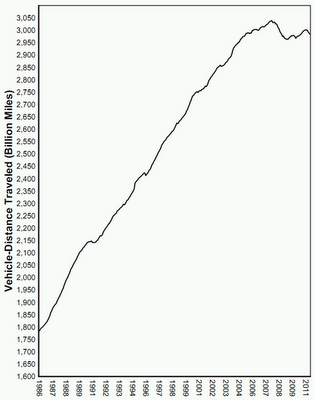 US Vehicle Miles Traveled*Peak Auto Weight*Peak Trucking Freight*Peak Bottled Water*Peak Soda Pop*Peak Human Body Fat*Peak Suburbia, Strip Malls and Parking Lots*Peak Blueberries in February from South America*Peak Chain Restaurants*Peak Resorts*Peak Downhill Skiing*Peak Gasoline-powered toys (jetskis, speed boats,snowmobiles, etc. except where they provide actual economic benefit.)*Peak RVs*Peak Air Conditioning*Peak Airports, Planes and Air TravelBut not peak rail, bicycle, boat travel or freight. Not Peak Public Transit. Not peak energy efficiency. Not peak alternative energy. Not peak vegetable gardens,chicken and goat raising, or beekeeping. Not Peak Food, Water, or Energy Prices.Not Peak Ceiling Fans, Peak Attic Insulation, Peak Solar Hot Water Systems. NotPeak Resiliency or Peak Self-Sufficiency by any means.
US Vehicle Miles Traveled*Peak Auto Weight*Peak Trucking Freight*Peak Bottled Water*Peak Soda Pop*Peak Human Body Fat*Peak Suburbia, Strip Malls and Parking Lots*Peak Blueberries in February from South America*Peak Chain Restaurants*Peak Resorts*Peak Downhill Skiing*Peak Gasoline-powered toys (jetskis, speed boats,snowmobiles, etc. except where they provide actual economic benefit.)*Peak RVs*Peak Air Conditioning*Peak Airports, Planes and Air TravelBut not peak rail, bicycle, boat travel or freight. Not Peak Public Transit. Not peak energy efficiency. Not peak alternative energy. Not peak vegetable gardens,chicken and goat raising, or beekeeping. Not Peak Food, Water, or Energy Prices.Not Peak Ceiling Fans, Peak Attic Insulation, Peak Solar Hot Water Systems. NotPeak Resiliency or Peak Self-Sufficiency by any means.
 US Health Costs compared to rest of worldAs people and governments grow poorer we will soonexperience*Peak Healthcare*Peak Pharmaceuticals*Peak Lifespan in the US*Peak ADD and ADHD*Peak tranquilizers and anti-depressants*Peak Prisons*Peak Medicare, Social Security and Welfare*Peak Washington D.C.But not Peak Food Stamps (otherwise too much social unrest).Probably not Peak Lottery as it's a way for people to gamble cheaply. Not PeakRetirement Age (for a while). And not Peak Family, Peak Community, Peak Relationships. These will be on the increase.Unfortunately, not Peak Homeless, Peak Crime, or Peak Disease. Sadly, probablynot Peak World Population until Peak Famine hits first. Does Peak Energy lead to PeakFertilizer which very quickly leads to Peak Food, even here in the U.S.? Let's hope it doesn't come tothat. Long term, Peak Arable Landdue to climate change is going to be bad enough.
US Health Costs compared to rest of worldAs people and governments grow poorer we will soonexperience*Peak Healthcare*Peak Pharmaceuticals*Peak Lifespan in the US*Peak ADD and ADHD*Peak tranquilizers and anti-depressants*Peak Prisons*Peak Medicare, Social Security and Welfare*Peak Washington D.C.But not Peak Food Stamps (otherwise too much social unrest).Probably not Peak Lottery as it's a way for people to gamble cheaply. Not PeakRetirement Age (for a while). And not Peak Family, Peak Community, Peak Relationships. These will be on the increase.Unfortunately, not Peak Homeless, Peak Crime, or Peak Disease. Sadly, probablynot Peak World Population until Peak Famine hits first. Does Peak Energy lead to PeakFertilizer which very quickly leads to Peak Food, even here in the U.S.? Let's hope it doesn't come tothat. Long term, Peak Arable Landdue to climate change is going to be bad enough.
As I said above, many of these peaks don't have to bepermanent. They could be temporarydownslopes creating local peaks until we retrench, reorganize in a way thatmakes sense given our resources, and then we can go forward again. Some of these Peaks in my view arebeneficial; some are going to cause a lot of suffering that is doubly sad dueto the fact that, with some foresight, we could have avoided them. In generalwith this list I'm not saying what should happen, just what is likely to happenas I gaze into the Peak Crystal Ball.
 They can be pretty from afarWe are at an interesting crossroads in history where aperfect storm of crises is going to create significant, rapid change. Many commonplace parts of modernsociety will hit their peak and then not instantly disappear, but undergo adecline. How slow or swift the decline will be depend on the circumstances aswell as various levels of corruption and/or government intervention (assumingthe two aren't synonymous.) Sometimes the peak may be a temporary one, if wecan manage to reorganize ourselves and our resources in a sensible manner. Some of the descents, however, arepermanent or at least will last for several generations.
They can be pretty from afarWe are at an interesting crossroads in history where aperfect storm of crises is going to create significant, rapid change. Many commonplace parts of modernsociety will hit their peak and then not instantly disappear, but undergo adecline. How slow or swift the decline will be depend on the circumstances aswell as various levels of corruption and/or government intervention (assumingthe two aren't synonymous.) Sometimes the peak may be a temporary one, if wecan manage to reorganize ourselves and our resources in a sensible manner. Some of the descents, however, arepermanent or at least will last for several generations.The financial crisis is all around us and will last at leastanother five years, if not ten. World Peak Oilalready happened in 2005 (U.S. Peak Oil was in 1971), and world crude oil productionis in gentle decline hidden by demand drop due to the recession. The oil crunchwill strongly hit in 2013 (or sooner, if anyone decides to airstrike Iran.) Andthen there's climate change, the ultimate humdinger that's awfully hard topredict anything about except that it will likely cause drought, famine,flooding, forced migrations, massive species extinction and a lot ofdeath. But given its uncertaintyand longer timeframe (ooh, maybe fifteen or twenty years before the real onslaught ofeffects) let's not worry about that one just yet.
 Let's get back to our immediate Peaks—Finance and Oil—andthe other Peaks related to them that have appeared or are soon to appear on thenear horizon. Now perhaps youbelieve Peak Oil is a hoax made up by oil companies and/or environmentalists.Perhaps you think the financial crisis is on the way to recovery and anotherhappy finance bubble is around the corner. Even so, just as an intellectualexercise, let's pretend there's less oil and financial wealth ahead for the vast majority of the human race. What would be the result?
Let's get back to our immediate Peaks—Finance and Oil—andthe other Peaks related to them that have appeared or are soon to appear on thenear horizon. Now perhaps youbelieve Peak Oil is a hoax made up by oil companies and/or environmentalists.Perhaps you think the financial crisis is on the way to recovery and anotherhappy finance bubble is around the corner. Even so, just as an intellectualexercise, let's pretend there's less oil and financial wealth ahead for the vast majority of the human race. What would be the result? Less liquidity, less energy, for starters. Which will lead to:*Peak Credit, which will lead to
 US Consumer Debt Levels*Peak Consumer Debt*Peak GDP*Peak Housing*Peak College, *Peak Exotic Vacations,*Peak Vegasand *Peak Stuff. (Basically, any activity or item financed by home equityloans for the past decade will shrink.) This will lead to *Peak Self-Storage, *Peak Housing Square Footage*Peak Lawns and Peak YardsWhich leads to *Peak Lawn Gnomes, *Peak Pink Flamingos, *Peak Lawn Mowers and *PeakLawn PesticidesIt doesn't necessarily lead to Peak Remodeling. Nor PeakHousing Density. Nor Peak UrbanInfill. Nor Peak Family Camping. Nor Peak Knowledge, Peak Community College, or Peak InternetConnectivity. Anything that can betransferred digitally—data, news, movies, video games, magazines, books, music,etc.--probably will not peak soon, though its hard copy form probably alreadyhas. This is not to say there willbe much profit in any digital media, however.
US Consumer Debt Levels*Peak Consumer Debt*Peak GDP*Peak Housing*Peak College, *Peak Exotic Vacations,*Peak Vegasand *Peak Stuff. (Basically, any activity or item financed by home equityloans for the past decade will shrink.) This will lead to *Peak Self-Storage, *Peak Housing Square Footage*Peak Lawns and Peak YardsWhich leads to *Peak Lawn Gnomes, *Peak Pink Flamingos, *Peak Lawn Mowers and *PeakLawn PesticidesIt doesn't necessarily lead to Peak Remodeling. Nor PeakHousing Density. Nor Peak UrbanInfill. Nor Peak Family Camping. Nor Peak Knowledge, Peak Community College, or Peak InternetConnectivity. Anything that can betransferred digitally—data, news, movies, video games, magazines, books, music,etc.--probably will not peak soon, though its hard copy form probably alreadyhas. This is not to say there willbe much profit in any digital media, however.As the rate of oil pumped out of the earth slows belowdemand, all oil-importing countries are going to see some significantshifts. They will include: *Peak Plastics, (which will lead to Peak Product Packaging,Peak Recycling, and Peak Cheap Plastic #@$% from China)*Peak Paved Roads and Peak Asphalt*Peak Internal Combustion Engines*Peak Cars (which will lead to Peak Home Garages, Peak AutoMechanics, Peak Gas Stations)*Peak Commute Distance and Vehicle Miles Traveled
 US Vehicle Miles Traveled*Peak Auto Weight*Peak Trucking Freight*Peak Bottled Water*Peak Soda Pop*Peak Human Body Fat*Peak Suburbia, Strip Malls and Parking Lots*Peak Blueberries in February from South America*Peak Chain Restaurants*Peak Resorts*Peak Downhill Skiing*Peak Gasoline-powered toys (jetskis, speed boats,snowmobiles, etc. except where they provide actual economic benefit.)*Peak RVs*Peak Air Conditioning*Peak Airports, Planes and Air TravelBut not peak rail, bicycle, boat travel or freight. Not Peak Public Transit. Not peak energy efficiency. Not peak alternative energy. Not peak vegetable gardens,chicken and goat raising, or beekeeping. Not Peak Food, Water, or Energy Prices.Not Peak Ceiling Fans, Peak Attic Insulation, Peak Solar Hot Water Systems. NotPeak Resiliency or Peak Self-Sufficiency by any means.
US Vehicle Miles Traveled*Peak Auto Weight*Peak Trucking Freight*Peak Bottled Water*Peak Soda Pop*Peak Human Body Fat*Peak Suburbia, Strip Malls and Parking Lots*Peak Blueberries in February from South America*Peak Chain Restaurants*Peak Resorts*Peak Downhill Skiing*Peak Gasoline-powered toys (jetskis, speed boats,snowmobiles, etc. except where they provide actual economic benefit.)*Peak RVs*Peak Air Conditioning*Peak Airports, Planes and Air TravelBut not peak rail, bicycle, boat travel or freight. Not Peak Public Transit. Not peak energy efficiency. Not peak alternative energy. Not peak vegetable gardens,chicken and goat raising, or beekeeping. Not Peak Food, Water, or Energy Prices.Not Peak Ceiling Fans, Peak Attic Insulation, Peak Solar Hot Water Systems. NotPeak Resiliency or Peak Self-Sufficiency by any means. US Health Costs compared to rest of worldAs people and governments grow poorer we will soonexperience*Peak Healthcare*Peak Pharmaceuticals*Peak Lifespan in the US*Peak ADD and ADHD*Peak tranquilizers and anti-depressants*Peak Prisons*Peak Medicare, Social Security and Welfare*Peak Washington D.C.But not Peak Food Stamps (otherwise too much social unrest).Probably not Peak Lottery as it's a way for people to gamble cheaply. Not PeakRetirement Age (for a while). And not Peak Family, Peak Community, Peak Relationships. These will be on the increase.Unfortunately, not Peak Homeless, Peak Crime, or Peak Disease. Sadly, probablynot Peak World Population until Peak Famine hits first. Does Peak Energy lead to PeakFertilizer which very quickly leads to Peak Food, even here in the U.S.? Let's hope it doesn't come tothat. Long term, Peak Arable Landdue to climate change is going to be bad enough.
US Health Costs compared to rest of worldAs people and governments grow poorer we will soonexperience*Peak Healthcare*Peak Pharmaceuticals*Peak Lifespan in the US*Peak ADD and ADHD*Peak tranquilizers and anti-depressants*Peak Prisons*Peak Medicare, Social Security and Welfare*Peak Washington D.C.But not Peak Food Stamps (otherwise too much social unrest).Probably not Peak Lottery as it's a way for people to gamble cheaply. Not PeakRetirement Age (for a while). And not Peak Family, Peak Community, Peak Relationships. These will be on the increase.Unfortunately, not Peak Homeless, Peak Crime, or Peak Disease. Sadly, probablynot Peak World Population until Peak Famine hits first. Does Peak Energy lead to PeakFertilizer which very quickly leads to Peak Food, even here in the U.S.? Let's hope it doesn't come tothat. Long term, Peak Arable Landdue to climate change is going to be bad enough.As I said above, many of these peaks don't have to bepermanent. They could be temporarydownslopes creating local peaks until we retrench, reorganize in a way thatmakes sense given our resources, and then we can go forward again. Some of these Peaks in my view arebeneficial; some are going to cause a lot of suffering that is doubly sad dueto the fact that, with some foresight, we could have avoided them. In generalwith this list I'm not saying what should happen, just what is likely to happenas I gaze into the Peak Crystal Ball.
Published on November 30, 2011 09:12
November 7, 2011
The Great Beaufort "Skedaddle"
They were at church when the wordcame. In the pews of Saint Helena's in Beaufort, South Carolina, master andslave alike heard that an enormous Yankee fleet was massing off Point Royal Sounda mere ten miles away. If Confederate defenses didn't hold, the town would haveto evacuate in a matter of hours. It was time to pack and to pray.
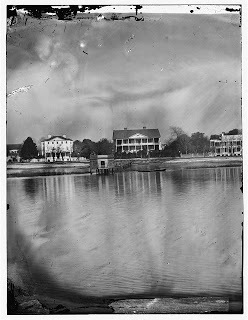 View of Beaufort, Dec 1861
View of Beaufort, Dec 1861
In 1861, Beaufort was one of thewealthiest, most cultured cities in America. The town boasted not only alibrary of three thousand volumes but also some of the most erudite, educatedmen in the South. Having built their elegant Greek Revival mansions withballrooms, chandeliers and two-story piazzas, planter families gathered hereeach summer to escape the heat and ague of their Sea Island plantations, aswell as socialize and talk politics. Secession politics. For more than a dozen years cries forsecession had risen from Beaufort, much of them led by its native son,rabble-rousing, fire-eater Robert Barnwell Rhett, remembered as the "Father ofSecession."
The Confederacy knew full wellthat Port Royal might be a target for a Northern base, but they couldn't besure other sites weren't also in the running and so were somewhat lackadaisicalin establishing defenses for Port Royal Sound. During the summer of 1861, localplantations reluctantly provided slaves to begin construction of two forts toguard the Sound's entrance: Fort Walker on Hilton Head Island and FortBeauregard on Phillips Island. But not only were the forts still incomplete by November,the artillery installed fell far short of what was originally proposed and evenfarther short of what was needed when the Yankees came calling.
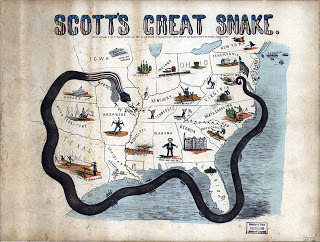 Plans had been underway in theNorth to take a Southern port since early summer, with Lincoln himself involvedin the selection. After all, to implement the "Anaconda Plan"—a tight blockadeof the Southern coastline intended to cripple the Confederate economy—U.S. Navywarships needed a place to refuel with the coal that gave them power. PortRoyal was one of the choicest deepwater ports on the Southern coast. That amassive Northern fleet was poised to sail was common knowledge to anyone who couldread a newspaper once The New York Times published the details inthe article, "The Great Naval Expedition," on October 26th. The onlyunknown was the destination, a secret that, remarkably, was successfully kept. It wasn't until they were at sea thatthe captain of each vessel opened a sealed envelope telling him where his shipwas headed.
Plans had been underway in theNorth to take a Southern port since early summer, with Lincoln himself involvedin the selection. After all, to implement the "Anaconda Plan"—a tight blockadeof the Southern coastline intended to cripple the Confederate economy—U.S. Navywarships needed a place to refuel with the coal that gave them power. PortRoyal was one of the choicest deepwater ports on the Southern coast. That amassive Northern fleet was poised to sail was common knowledge to anyone who couldread a newspaper once The New York Times published the details inthe article, "The Great Naval Expedition," on October 26th. The onlyunknown was the destination, a secret that, remarkably, was successfully kept. It wasn't until they were at sea thatthe captain of each vessel opened a sealed envelope telling him where his shipwas headed.
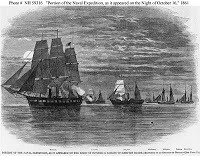 The Great Naval Expedition en routeThe fleet that set out on Oct 29thwould prove to be the largest U.S. naval and amphibious expedition in theentire nineteenth century. Itincluded 17 warships, 25 colliers, 33 transports, 12,000 infantry, 600 marines,and 157 big guns. Port Royal, with its two cobbled-together forts supplied withonly 2500 men, 4 gunboats, and 39 guns between them, didn't stand a chance.
The Great Naval Expedition en routeThe fleet that set out on Oct 29thwould prove to be the largest U.S. naval and amphibious expedition in theentire nineteenth century. Itincluded 17 warships, 25 colliers, 33 transports, 12,000 infantry, 600 marines,and 157 big guns. Port Royal, with its two cobbled-together forts supplied withonly 2500 men, 4 gunboats, and 39 guns between them, didn't stand a chance.
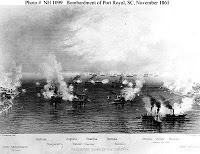 Bombardment of Port RoyalNature came to the South's aid inthe form of a storm that sank some of the Northern fleet along the way, and thenrough water delayed the day of the final attack. But when November 7thdawned clear and calm, the water so still it was glassy, enough of the North'swarships were available to commence battle. Union ships concentrated theirenfilade on Fort Walker. To the soldiers inside, the sound of artillery wasdeafening. By noon, only three of Fort Walker's water battery guns were stilloperational; by 2:30 p.m., all powder was gone. The time had come to abandonthe fort. The command at Fort Beauregard, concerned about being trapped onPhillips Island with no line of retreat, quickly followed suit. Thankfully,casualties on both sides were light. Accounts vary, but the Confederatesfinished the day with between 11 and 59 killed and an equivalent number woundedor missing, while the Union fleet saw 8 dead and 23 wounded.
Bombardment of Port RoyalNature came to the South's aid inthe form of a storm that sank some of the Northern fleet along the way, and thenrough water delayed the day of the final attack. But when November 7thdawned clear and calm, the water so still it was glassy, enough of the North'swarships were available to commence battle. Union ships concentrated theirenfilade on Fort Walker. To the soldiers inside, the sound of artillery wasdeafening. By noon, only three of Fort Walker's water battery guns were stilloperational; by 2:30 p.m., all powder was gone. The time had come to abandonthe fort. The command at Fort Beauregard, concerned about being trapped onPhillips Island with no line of retreat, quickly followed suit. Thankfully,casualties on both sides were light. Accounts vary, but the Confederatesfinished the day with between 11 and 59 killed and an equivalent number woundedor missing, while the Union fleet saw 8 dead and 23 wounded.
Even with the enormous attackingnaval force, Sea Island planters had been so confident in the defending fortsmanned with recruits from their very own Beaufort Volunteer Artillery that manywatched the battle from shore on nearby Saint Helena Island. But whenConfederate cannons grew silent and cheers reverberated from the Northern ships,they knew something had gone dreadfully wrong. They hurried home to evacuate,no doubt pained to leave bolls of valuable Sea Island cotton still unpicked inthe fields.
When news of the battle's outcomereached Beaufort, a kind of panic ensued. Facing an invading army of Yankeeswas too dreadful to contemplate; flight was of the essence. But what to take,what to leave behind? The daguerreotypes? The silver? Of course the familybible must be packed. Some loaded up carriages, hoping to stay ahead of the Yankeeson the long overland route to safety. But Beaufort was lucky that day—there wasa steamer anchored in the river that could take hundreds swiftly to Charleston.However, it had only so much room. Furniture, clothing, horses, and the vastmajority of their most valuable property—slaves—would have to be left behind.In the tumult, even food and dinner dishes were abandoned on dining room tables,testament to the haste involved. That evening the steamer departed overflowingwith Beaufort's white citizenry along with every jewel and sentimental itemthey could squeeze on board. Legend has it that when Yankee forces arrived twodays later to occupy the town, they found just one white man remaining inBeaufort, and he was dead drunk.
What must the deserted slaves,who spoke Gullah, their own Sea Island patois, have thought as the ladensteamer chugged away from Beaufort's dock? Did they realize that history hadunexpectedly turned a corner right in front of them, and that now, aftercenturies of captivity as a people, they were suddenly free? Perhaps thepolitical ramifications didn't sink in that night, but before the first Yankeesarrived, clothing and other finery had been looted (liberated?) from the grandhomes, and food and liquor thoroughly consumed in an understandable celebrationof events.
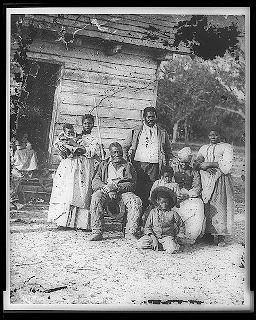 Five generations now free (1862)It is estimated 8-10,000 slaveswere left behind in the Sea Islands when the white population fled. They weresoon joined by thousands of others who escaped to the region once they realizedthat Northern occupation meant freedom. They all needed food and shelter, and since the EmancipationProclamation had yet to happen, their legal status, beyond being "contraband," wasunclear. The Army asked for help and received it in the form of the Port RoyalExperiment. Financed and organized by Northern abolitionist charities, theExperiment worked as a test case to create self-sufficiency among the formerslaves. Its success points to what Reconstruction might have been if less corruptionand more competence had been at its helm. Northern missionaries and teachers flocked to the Sea Islands to createschools and aid societies. Former slaves were allowed to farm the confiscatedplantations and were paid $1 per 400 lbs of cotton they were able to harvest. The Penn School on St. Helena Islandwas one of the earliest schools established for freed slaves and can be visitedas part of the Penn Center today.
Five generations now free (1862)It is estimated 8-10,000 slaveswere left behind in the Sea Islands when the white population fled. They weresoon joined by thousands of others who escaped to the region once they realizedthat Northern occupation meant freedom. They all needed food and shelter, and since the EmancipationProclamation had yet to happen, their legal status, beyond being "contraband," wasunclear. The Army asked for help and received it in the form of the Port RoyalExperiment. Financed and organized by Northern abolitionist charities, theExperiment worked as a test case to create self-sufficiency among the formerslaves. Its success points to what Reconstruction might have been if less corruptionand more competence had been at its helm. Northern missionaries and teachers flocked to the Sea Islands to createschools and aid societies. Former slaves were allowed to farm the confiscatedplantations and were paid $1 per 400 lbs of cotton they were able to harvest. The Penn School on St. Helena Islandwas one of the earliest schools established for freed slaves and can be visitedas part of the Penn Center today.
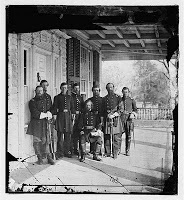 Yankees at home on a Beaufort piazza (1862)The Union Army found Beaufort apleasant setting for officer's quarters, administrative offices andhospitals. Because the Armyoccupied Beaufort until the end of the war, the fine mansions, while sufferingdamage, were not burned to the ground like so many other Southern towns and surroundingSea Island plantations. To this day Beaufort's centuries-old live oaks and antebellumcharm remain. Port Royal turned out to be as advantageous a harbor as the Unionhad hoped and did much to strengthen the potency of the blockade. After thewar, most planter families—their sons dead, their plantations burnt, theirBeaufort homes sold in government auctions for back taxes (often without theirknowledge)—never returned. The civilization that was antebellum Beaufortvanished into the night with that last steamer.
Yankees at home on a Beaufort piazza (1862)The Union Army found Beaufort apleasant setting for officer's quarters, administrative offices andhospitals. Because the Armyoccupied Beaufort until the end of the war, the fine mansions, while sufferingdamage, were not burned to the ground like so many other Southern towns and surroundingSea Island plantations. To this day Beaufort's centuries-old live oaks and antebellumcharm remain. Port Royal turned out to be as advantageous a harbor as the Unionhad hoped and did much to strengthen the potency of the blockade. After thewar, most planter families—their sons dead, their plantations burnt, theirBeaufort homes sold in government auctions for back taxes (often without theirknowledge)—never returned. The civilization that was antebellum Beaufortvanished into the night with that last steamer.
It is rare that the wheel offortune spins as violently as it did on November 7, 1861. The town that hadadvocated so fiercely for secession was the first to feel the brunt of anoccupying army. A people remarkable for their wealth lost almost everything ina matter of hours. A region that so defiantly insisted that its way oflife—slavery—was non-negotiable ended up being the first to have a colony offormer slaves experiment with what it meant to be free. The Great Skedaddleindeed.
Photos above are from (in order): Library of Congress, Library of Congress, Harper's Weekly 11/9/1861, Harper's Weekly 11/30/1861, Library of Congress, Library of Congress.

 View of Beaufort, Dec 1861
View of Beaufort, Dec 1861In 1861, Beaufort was one of thewealthiest, most cultured cities in America. The town boasted not only alibrary of three thousand volumes but also some of the most erudite, educatedmen in the South. Having built their elegant Greek Revival mansions withballrooms, chandeliers and two-story piazzas, planter families gathered hereeach summer to escape the heat and ague of their Sea Island plantations, aswell as socialize and talk politics. Secession politics. For more than a dozen years cries forsecession had risen from Beaufort, much of them led by its native son,rabble-rousing, fire-eater Robert Barnwell Rhett, remembered as the "Father ofSecession."
The Confederacy knew full wellthat Port Royal might be a target for a Northern base, but they couldn't besure other sites weren't also in the running and so were somewhat lackadaisicalin establishing defenses for Port Royal Sound. During the summer of 1861, localplantations reluctantly provided slaves to begin construction of two forts toguard the Sound's entrance: Fort Walker on Hilton Head Island and FortBeauregard on Phillips Island. But not only were the forts still incomplete by November,the artillery installed fell far short of what was originally proposed and evenfarther short of what was needed when the Yankees came calling.
 Plans had been underway in theNorth to take a Southern port since early summer, with Lincoln himself involvedin the selection. After all, to implement the "Anaconda Plan"—a tight blockadeof the Southern coastline intended to cripple the Confederate economy—U.S. Navywarships needed a place to refuel with the coal that gave them power. PortRoyal was one of the choicest deepwater ports on the Southern coast. That amassive Northern fleet was poised to sail was common knowledge to anyone who couldread a newspaper once The New York Times published the details inthe article, "The Great Naval Expedition," on October 26th. The onlyunknown was the destination, a secret that, remarkably, was successfully kept. It wasn't until they were at sea thatthe captain of each vessel opened a sealed envelope telling him where his shipwas headed.
Plans had been underway in theNorth to take a Southern port since early summer, with Lincoln himself involvedin the selection. After all, to implement the "Anaconda Plan"—a tight blockadeof the Southern coastline intended to cripple the Confederate economy—U.S. Navywarships needed a place to refuel with the coal that gave them power. PortRoyal was one of the choicest deepwater ports on the Southern coast. That amassive Northern fleet was poised to sail was common knowledge to anyone who couldread a newspaper once The New York Times published the details inthe article, "The Great Naval Expedition," on October 26th. The onlyunknown was the destination, a secret that, remarkably, was successfully kept. It wasn't until they were at sea thatthe captain of each vessel opened a sealed envelope telling him where his shipwas headed.  The Great Naval Expedition en routeThe fleet that set out on Oct 29thwould prove to be the largest U.S. naval and amphibious expedition in theentire nineteenth century. Itincluded 17 warships, 25 colliers, 33 transports, 12,000 infantry, 600 marines,and 157 big guns. Port Royal, with its two cobbled-together forts supplied withonly 2500 men, 4 gunboats, and 39 guns between them, didn't stand a chance.
The Great Naval Expedition en routeThe fleet that set out on Oct 29thwould prove to be the largest U.S. naval and amphibious expedition in theentire nineteenth century. Itincluded 17 warships, 25 colliers, 33 transports, 12,000 infantry, 600 marines,and 157 big guns. Port Royal, with its two cobbled-together forts supplied withonly 2500 men, 4 gunboats, and 39 guns between them, didn't stand a chance.  Bombardment of Port RoyalNature came to the South's aid inthe form of a storm that sank some of the Northern fleet along the way, and thenrough water delayed the day of the final attack. But when November 7thdawned clear and calm, the water so still it was glassy, enough of the North'swarships were available to commence battle. Union ships concentrated theirenfilade on Fort Walker. To the soldiers inside, the sound of artillery wasdeafening. By noon, only three of Fort Walker's water battery guns were stilloperational; by 2:30 p.m., all powder was gone. The time had come to abandonthe fort. The command at Fort Beauregard, concerned about being trapped onPhillips Island with no line of retreat, quickly followed suit. Thankfully,casualties on both sides were light. Accounts vary, but the Confederatesfinished the day with between 11 and 59 killed and an equivalent number woundedor missing, while the Union fleet saw 8 dead and 23 wounded.
Bombardment of Port RoyalNature came to the South's aid inthe form of a storm that sank some of the Northern fleet along the way, and thenrough water delayed the day of the final attack. But when November 7thdawned clear and calm, the water so still it was glassy, enough of the North'swarships were available to commence battle. Union ships concentrated theirenfilade on Fort Walker. To the soldiers inside, the sound of artillery wasdeafening. By noon, only three of Fort Walker's water battery guns were stilloperational; by 2:30 p.m., all powder was gone. The time had come to abandonthe fort. The command at Fort Beauregard, concerned about being trapped onPhillips Island with no line of retreat, quickly followed suit. Thankfully,casualties on both sides were light. Accounts vary, but the Confederatesfinished the day with between 11 and 59 killed and an equivalent number woundedor missing, while the Union fleet saw 8 dead and 23 wounded.Even with the enormous attackingnaval force, Sea Island planters had been so confident in the defending fortsmanned with recruits from their very own Beaufort Volunteer Artillery that manywatched the battle from shore on nearby Saint Helena Island. But whenConfederate cannons grew silent and cheers reverberated from the Northern ships,they knew something had gone dreadfully wrong. They hurried home to evacuate,no doubt pained to leave bolls of valuable Sea Island cotton still unpicked inthe fields.
When news of the battle's outcomereached Beaufort, a kind of panic ensued. Facing an invading army of Yankeeswas too dreadful to contemplate; flight was of the essence. But what to take,what to leave behind? The daguerreotypes? The silver? Of course the familybible must be packed. Some loaded up carriages, hoping to stay ahead of the Yankeeson the long overland route to safety. But Beaufort was lucky that day—there wasa steamer anchored in the river that could take hundreds swiftly to Charleston.However, it had only so much room. Furniture, clothing, horses, and the vastmajority of their most valuable property—slaves—would have to be left behind.In the tumult, even food and dinner dishes were abandoned on dining room tables,testament to the haste involved. That evening the steamer departed overflowingwith Beaufort's white citizenry along with every jewel and sentimental itemthey could squeeze on board. Legend has it that when Yankee forces arrived twodays later to occupy the town, they found just one white man remaining inBeaufort, and he was dead drunk.
What must the deserted slaves,who spoke Gullah, their own Sea Island patois, have thought as the ladensteamer chugged away from Beaufort's dock? Did they realize that history hadunexpectedly turned a corner right in front of them, and that now, aftercenturies of captivity as a people, they were suddenly free? Perhaps thepolitical ramifications didn't sink in that night, but before the first Yankeesarrived, clothing and other finery had been looted (liberated?) from the grandhomes, and food and liquor thoroughly consumed in an understandable celebrationof events.
 Five generations now free (1862)It is estimated 8-10,000 slaveswere left behind in the Sea Islands when the white population fled. They weresoon joined by thousands of others who escaped to the region once they realizedthat Northern occupation meant freedom. They all needed food and shelter, and since the EmancipationProclamation had yet to happen, their legal status, beyond being "contraband," wasunclear. The Army asked for help and received it in the form of the Port RoyalExperiment. Financed and organized by Northern abolitionist charities, theExperiment worked as a test case to create self-sufficiency among the formerslaves. Its success points to what Reconstruction might have been if less corruptionand more competence had been at its helm. Northern missionaries and teachers flocked to the Sea Islands to createschools and aid societies. Former slaves were allowed to farm the confiscatedplantations and were paid $1 per 400 lbs of cotton they were able to harvest. The Penn School on St. Helena Islandwas one of the earliest schools established for freed slaves and can be visitedas part of the Penn Center today.
Five generations now free (1862)It is estimated 8-10,000 slaveswere left behind in the Sea Islands when the white population fled. They weresoon joined by thousands of others who escaped to the region once they realizedthat Northern occupation meant freedom. They all needed food and shelter, and since the EmancipationProclamation had yet to happen, their legal status, beyond being "contraband," wasunclear. The Army asked for help and received it in the form of the Port RoyalExperiment. Financed and organized by Northern abolitionist charities, theExperiment worked as a test case to create self-sufficiency among the formerslaves. Its success points to what Reconstruction might have been if less corruptionand more competence had been at its helm. Northern missionaries and teachers flocked to the Sea Islands to createschools and aid societies. Former slaves were allowed to farm the confiscatedplantations and were paid $1 per 400 lbs of cotton they were able to harvest. The Penn School on St. Helena Islandwas one of the earliest schools established for freed slaves and can be visitedas part of the Penn Center today. Yankees at home on a Beaufort piazza (1862)The Union Army found Beaufort apleasant setting for officer's quarters, administrative offices andhospitals. Because the Armyoccupied Beaufort until the end of the war, the fine mansions, while sufferingdamage, were not burned to the ground like so many other Southern towns and surroundingSea Island plantations. To this day Beaufort's centuries-old live oaks and antebellumcharm remain. Port Royal turned out to be as advantageous a harbor as the Unionhad hoped and did much to strengthen the potency of the blockade. After thewar, most planter families—their sons dead, their plantations burnt, theirBeaufort homes sold in government auctions for back taxes (often without theirknowledge)—never returned. The civilization that was antebellum Beaufortvanished into the night with that last steamer.
Yankees at home on a Beaufort piazza (1862)The Union Army found Beaufort apleasant setting for officer's quarters, administrative offices andhospitals. Because the Armyoccupied Beaufort until the end of the war, the fine mansions, while sufferingdamage, were not burned to the ground like so many other Southern towns and surroundingSea Island plantations. To this day Beaufort's centuries-old live oaks and antebellumcharm remain. Port Royal turned out to be as advantageous a harbor as the Unionhad hoped and did much to strengthen the potency of the blockade. After thewar, most planter families—their sons dead, their plantations burnt, theirBeaufort homes sold in government auctions for back taxes (often without theirknowledge)—never returned. The civilization that was antebellum Beaufortvanished into the night with that last steamer.It is rare that the wheel offortune spins as violently as it did on November 7, 1861. The town that hadadvocated so fiercely for secession was the first to feel the brunt of anoccupying army. A people remarkable for their wealth lost almost everything ina matter of hours. A region that so defiantly insisted that its way oflife—slavery—was non-negotiable ended up being the first to have a colony offormer slaves experiment with what it meant to be free. The Great Skedaddleindeed.
Photos above are from (in order): Library of Congress, Library of Congress, Harper's Weekly 11/9/1861, Harper's Weekly 11/30/1861, Library of Congress, Library of Congress.
Published on November 07, 2011 09:37
November 3, 2011
The Civil War--A Rough Beast Slouches
@font-face { font-family: "Cambria";}p.MsoNormal, li.MsoNormal, div.MsoNormal { margin: 0in 0in 0.0001pt; font-size: 12pt; font-family: "Times New Roman"; }div.Section1 { page: Section1; }
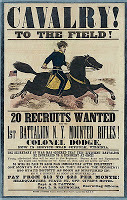
In 1849 things were good in Beaufort, South Carolina andabout to get better. Over the next decade Britain's demand for Sea Islandcotton would go through the roof with prices to suit. From 1850 – 1860 a great many of Beaufort'sgrand houses were built as the money flowed in. Though friction with the Northwas increasing and inflammatory talk about secession was escalating, they were adamant that their way of life was not negotiable. What wasjust around the corner for the white population of Beaufort—collapse, calamityand ruin--no one saw coming.
 Conundrum The seeds for the Civil War were sown long before 1861. Even our founding fathers knew they'dembedded a desperate conundrum into the Constitution with its expressprotection of both human rights and slavery in the same document. Benjamin Franklin foresaw much when hesaid, "Slavery is such an atrocious debasement of human nature, that itsvery extirpation, if not performed with solicitous care, may sometimes open asource of serious evils." Thomas Jefferson knew trouble lay ahead when he said about slavery, "Wehave the wolf by the ear and feel the danger of either holding on or lettinghim loose." Patrick Henry wrote,"I believe a time will come when an opportunity will be offered to abolishthis lamentable evil. Everything we do is to improve it, if it happens in ourday; if not, let us transmit to our descendants, together with our slaves, apity for their unhappy lot and an abhorrence of slavery."
Conundrum The seeds for the Civil War were sown long before 1861. Even our founding fathers knew they'dembedded a desperate conundrum into the Constitution with its expressprotection of both human rights and slavery in the same document. Benjamin Franklin foresaw much when hesaid, "Slavery is such an atrocious debasement of human nature, that itsvery extirpation, if not performed with solicitous care, may sometimes open asource of serious evils." Thomas Jefferson knew trouble lay ahead when he said about slavery, "Wehave the wolf by the ear and feel the danger of either holding on or lettinghim loose." Patrick Henry wrote,"I believe a time will come when an opportunity will be offered to abolishthis lamentable evil. Everything we do is to improve it, if it happens in ourday; if not, let us transmit to our descendants, together with our slaves, apity for their unhappy lot and an abhorrence of slavery."
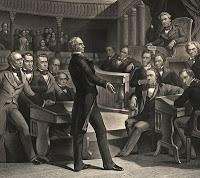 The Triumvirate at WorkPity their descendants as they might, the problem that wastoo thorny for these great men to solve was left for a future generation tosuffer through. Two economic systems fought for dominance—the South'sagricultural economy made possible by slave labor and the North's industrialeconomy with its denser population and huge influx of immigrants. Both wanted to expand into the westernterritories, the South to preserve the delicate balance of power in Congress, the North to populate the vast plains and the westwith their burgeoning population. Theentire first half of the 19th century was spent in compromise toprevent these two forces from tearing the country apart. The great triumvirate of Webster, Clayand Calhoun plied their wiles in the Senate year after year to preserve the youngnation. But in the end the internal contradictions of the competing ideologiesand economic systems were too much. The center could not hold. As Yeats notesso often happens with war, "a blood-dimmed tide" was loosed upon the world.
The Triumvirate at WorkPity their descendants as they might, the problem that wastoo thorny for these great men to solve was left for a future generation tosuffer through. Two economic systems fought for dominance—the South'sagricultural economy made possible by slave labor and the North's industrialeconomy with its denser population and huge influx of immigrants. Both wanted to expand into the westernterritories, the South to preserve the delicate balance of power in Congress, the North to populate the vast plains and the westwith their burgeoning population. Theentire first half of the 19th century was spent in compromise toprevent these two forces from tearing the country apart. The great triumvirate of Webster, Clayand Calhoun plied their wiles in the Senate year after year to preserve the youngnation. But in the end the internal contradictions of the competing ideologiesand economic systems were too much. The center could not hold. As Yeats notesso often happens with war, "a blood-dimmed tide" was loosed upon the world.
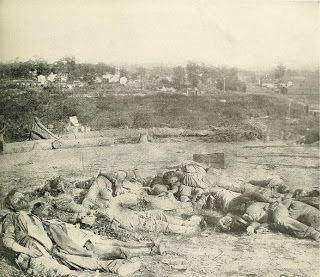 The Wages of RhetoricDid antebellum Beaufort have no inkling as events began tospin in an ever-widening gyre? Could they not see that the rhetoric theycheered would turn into fields of blood and mud? Perhaps no one, Northerner or Southerner, could haveanticipated half a million lives would be lost. Indeed both sides expected the conflict to end in a matter of months. Perhaps Jefferson was right that both holding on toslavery or letting go involved disaster. But could the South havetransitioned away from a slave economy in a way less catastrophic anddestructive? Could they have avoid the rough beast slouching towards them? This is what Beaufort 1849explores.
The Wages of RhetoricDid antebellum Beaufort have no inkling as events began tospin in an ever-widening gyre? Could they not see that the rhetoric theycheered would turn into fields of blood and mud? Perhaps no one, Northerner or Southerner, could haveanticipated half a million lives would be lost. Indeed both sides expected the conflict to end in a matter of months. Perhaps Jefferson was right that both holding on toslavery or letting go involved disaster. But could the South havetransitioned away from a slave economy in a way less catastrophic anddestructive? Could they have avoid the rough beast slouching towards them? This is what Beaufort 1849explores.
Those who believe their way of life is not negotiable mayfind, indeed, that history does not negotiate.
THE SECOND COMING (William Butler Yeats)
Turning and turning in the widening gyre
The falcon cannot hear the falconer;
Things fall apart; the centre cannot hold;
Mere anarchy is loosed upon the world,
The blood-dimmed tide is loosed, and everywhere
The ceremony of innocence is drowned;
The best lack all conviction, while the worst
Are full of passionate intensity.
Surely some revelation is at hand;
Surely the Second Coming is at hand.
The Second Coming! Hardly are those words out
When a vast image out of Spiritus Mundi
Troubles my sight: a waste of desert sand;
A shape with lion body and the head of a man,
A gaze blank and pitiless as the sun,
Is moving its slow thighs, while all about it
Wind shadows of the indignant desert birds.
The darkness drops again but now I know
That twenty centuries of stony sleep
Were vexed to nightmare by a rocking cradle,
And what rough beast, its hour come round at last,
Slouches towards Bethlehem to be born?


In 1849 things were good in Beaufort, South Carolina andabout to get better. Over the next decade Britain's demand for Sea Islandcotton would go through the roof with prices to suit. From 1850 – 1860 a great many of Beaufort'sgrand houses were built as the money flowed in. Though friction with the Northwas increasing and inflammatory talk about secession was escalating, they were adamant that their way of life was not negotiable. What wasjust around the corner for the white population of Beaufort—collapse, calamityand ruin--no one saw coming.
 Conundrum The seeds for the Civil War were sown long before 1861. Even our founding fathers knew they'dembedded a desperate conundrum into the Constitution with its expressprotection of both human rights and slavery in the same document. Benjamin Franklin foresaw much when hesaid, "Slavery is such an atrocious debasement of human nature, that itsvery extirpation, if not performed with solicitous care, may sometimes open asource of serious evils." Thomas Jefferson knew trouble lay ahead when he said about slavery, "Wehave the wolf by the ear and feel the danger of either holding on or lettinghim loose." Patrick Henry wrote,"I believe a time will come when an opportunity will be offered to abolishthis lamentable evil. Everything we do is to improve it, if it happens in ourday; if not, let us transmit to our descendants, together with our slaves, apity for their unhappy lot and an abhorrence of slavery."
Conundrum The seeds for the Civil War were sown long before 1861. Even our founding fathers knew they'dembedded a desperate conundrum into the Constitution with its expressprotection of both human rights and slavery in the same document. Benjamin Franklin foresaw much when hesaid, "Slavery is such an atrocious debasement of human nature, that itsvery extirpation, if not performed with solicitous care, may sometimes open asource of serious evils." Thomas Jefferson knew trouble lay ahead when he said about slavery, "Wehave the wolf by the ear and feel the danger of either holding on or lettinghim loose." Patrick Henry wrote,"I believe a time will come when an opportunity will be offered to abolishthis lamentable evil. Everything we do is to improve it, if it happens in ourday; if not, let us transmit to our descendants, together with our slaves, apity for their unhappy lot and an abhorrence of slavery." The Triumvirate at WorkPity their descendants as they might, the problem that wastoo thorny for these great men to solve was left for a future generation tosuffer through. Two economic systems fought for dominance—the South'sagricultural economy made possible by slave labor and the North's industrialeconomy with its denser population and huge influx of immigrants. Both wanted to expand into the westernterritories, the South to preserve the delicate balance of power in Congress, the North to populate the vast plains and the westwith their burgeoning population. Theentire first half of the 19th century was spent in compromise toprevent these two forces from tearing the country apart. The great triumvirate of Webster, Clayand Calhoun plied their wiles in the Senate year after year to preserve the youngnation. But in the end the internal contradictions of the competing ideologiesand economic systems were too much. The center could not hold. As Yeats notesso often happens with war, "a blood-dimmed tide" was loosed upon the world.
The Triumvirate at WorkPity their descendants as they might, the problem that wastoo thorny for these great men to solve was left for a future generation tosuffer through. Two economic systems fought for dominance—the South'sagricultural economy made possible by slave labor and the North's industrialeconomy with its denser population and huge influx of immigrants. Both wanted to expand into the westernterritories, the South to preserve the delicate balance of power in Congress, the North to populate the vast plains and the westwith their burgeoning population. Theentire first half of the 19th century was spent in compromise toprevent these two forces from tearing the country apart. The great triumvirate of Webster, Clayand Calhoun plied their wiles in the Senate year after year to preserve the youngnation. But in the end the internal contradictions of the competing ideologiesand economic systems were too much. The center could not hold. As Yeats notesso often happens with war, "a blood-dimmed tide" was loosed upon the world.  The Wages of RhetoricDid antebellum Beaufort have no inkling as events began tospin in an ever-widening gyre? Could they not see that the rhetoric theycheered would turn into fields of blood and mud? Perhaps no one, Northerner or Southerner, could haveanticipated half a million lives would be lost. Indeed both sides expected the conflict to end in a matter of months. Perhaps Jefferson was right that both holding on toslavery or letting go involved disaster. But could the South havetransitioned away from a slave economy in a way less catastrophic anddestructive? Could they have avoid the rough beast slouching towards them? This is what Beaufort 1849explores.
The Wages of RhetoricDid antebellum Beaufort have no inkling as events began tospin in an ever-widening gyre? Could they not see that the rhetoric theycheered would turn into fields of blood and mud? Perhaps no one, Northerner or Southerner, could haveanticipated half a million lives would be lost. Indeed both sides expected the conflict to end in a matter of months. Perhaps Jefferson was right that both holding on toslavery or letting go involved disaster. But could the South havetransitioned away from a slave economy in a way less catastrophic anddestructive? Could they have avoid the rough beast slouching towards them? This is what Beaufort 1849explores. Those who believe their way of life is not negotiable mayfind, indeed, that history does not negotiate.
THE SECOND COMING (William Butler Yeats)
Turning and turning in the widening gyre
The falcon cannot hear the falconer;
Things fall apart; the centre cannot hold;
Mere anarchy is loosed upon the world,
The blood-dimmed tide is loosed, and everywhere
The ceremony of innocence is drowned;
The best lack all conviction, while the worst
Are full of passionate intensity.
Surely some revelation is at hand;
Surely the Second Coming is at hand.
The Second Coming! Hardly are those words out
When a vast image out of Spiritus Mundi
Troubles my sight: a waste of desert sand;
A shape with lion body and the head of a man,
A gaze blank and pitiless as the sun,
Is moving its slow thighs, while all about it
Wind shadows of the indignant desert birds.
The darkness drops again but now I know
That twenty centuries of stony sleep
Were vexed to nightmare by a rocking cradle,
And what rough beast, its hour come round at last,
Slouches towards Bethlehem to be born?
Published on November 03, 2011 21:02
October 12, 2011
Beaufort Angel Oak
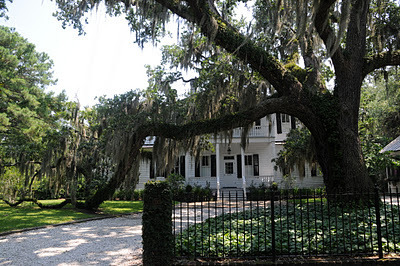 According to Beaufort sources, any oak tree that has grown until its limbs touch the ground is an angel oak. Here is a very fine Beaufort specimen obviously cherished and accommodated by the people who are its custodians. (I won't say owners. Owners of the house come and go. The oak remains.)
According to Beaufort sources, any oak tree that has grown until its limbs touch the ground is an angel oak. Here is a very fine Beaufort specimen obviously cherished and accommodated by the people who are its custodians. (I won't say owners. Owners of the house come and go. The oak remains.)  The granddaddy of all angel oaks is the one that deserves capital letters, Angel Oak, and it lives on Johns Island near Charleston. (It is thought to be 1500 years old and one of the oldest living organisms east of the Mississippi River.)
The granddaddy of all angel oaks is the one that deserves capital letters, Angel Oak, and it lives on Johns Island near Charleston. (It is thought to be 1500 years old and one of the oldest living organisms east of the Mississippi River.)These oaks have weathered hurricanes and floods, witnessed centuries of human cares and concerns, the generations passing beneath their limbs. All trees have their own energy, personality, if you will. These trees have wisdom.
Published on October 12, 2011 07:03
September 8, 2011
Beaufort 1849 Now Available on Apple iBooks
Find Beaufort 1849 on Apple iBooks, available through the iBooks app or the iTunes Bookstore. Available in six countries--Australia, Canada, France, Germany, United Kingdom, United States. Can be downloaded to the iPad, iPhone, or iPod Touch.
Just out of curiosity, do you use an e-reader? Which one? (Leave a comment!) I've been using a Kindle lately, though I do still peruse regular books.
Just out of curiosity, do you use an e-reader? Which one? (Leave a comment!) I've been using a Kindle lately, though I do still peruse regular books.
Published on September 08, 2011 14:45
August 30, 2011
Eternal Jane Eyre
 I recently watched again the new film version of Jane Eyre directed by Cary Fukunaga. Is it the quintessential Jane Eyre for all time? Hard to say, but it is very fine on a number of fronts. The casting for Jane and Rochester are quite good (Jane is young, small, and plain, but not homely); the cinematography, especially of the moors, is marvelous; they've portrayed the brooding gothic manor of Thornfield perfectly; and the costuming is impeccable. The gypsy fortune teller scene is left out (how is this possible?) but the River's part of the story is interesting and woven in well with the rest, an uncommon achievement. Of the five or so versions of Jane Eyre that I've seen, I'd say this is my favorite. Two thumbs up from me.
I recently watched again the new film version of Jane Eyre directed by Cary Fukunaga. Is it the quintessential Jane Eyre for all time? Hard to say, but it is very fine on a number of fronts. The casting for Jane and Rochester are quite good (Jane is young, small, and plain, but not homely); the cinematography, especially of the moors, is marvelous; they've portrayed the brooding gothic manor of Thornfield perfectly; and the costuming is impeccable. The gypsy fortune teller scene is left out (how is this possible?) but the River's part of the story is interesting and woven in well with the rest, an uncommon achievement. Of the five or so versions of Jane Eyre that I've seen, I'd say this is my favorite. Two thumbs up from me.When this movie came out in March, The New York Times had a nice piece on how Jane Eyre had been filmed at least 18 times for cinema and another 9 times for television. Holy cow. It may be one of the most filmed books ever. Obviously, Jane Eyre has a quality that makes us revisit her again and again, with Janes and Rochesters of all sorts trotting across both the screens of our culture and the mental screens of our minds.
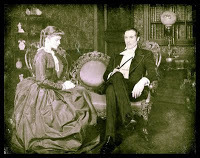
Just wrong for the part
There have been gothic Janes (1943), happy Janes (1934), old Janes (1970), musical stage Janes (2000—I saw it! I liked it!) and even a Katherine Hepburn stage Jane (1937). (Evidently she was awful. The playwright who wrote the stage adaptation demanded she be removed from the cast.) And let's not forget Zombie Jane (I Walked With a Zombie, 1943, infused with voodoo, supposedly inspired by Jane Eyre. I've got to see this. Wonder if it's on Netflix?)

Happy Jane
The happy Jane version of 1934 (available in bits and pieces on Youtube) bears only a passing resemblance to what Brontë wrote, but it has its amusements. Jane is a buxom, platinum blonde who could double for Jean Harlow. Rochester is an affable English gentleman with intense, longing stares. Thornfield Hall is Georgian palace downstairs and Eastlake Victorian upstairs. And the costuming! No corsets for this Jane, her high-waisted dresses no doubt made her look fashionable in the 1930's but are entirely wrong for the 1840's. After spending many hours pouring over fashion plates in Godey's Lady's magazine, I confess I admire period flicks that pay attention to detail. In the new Jane Eyre, Rochester wears spiffy silk waistcoasts, (I'd love to see them come back in fashion!) although they could be even bolder in color. And Jane's dresses hit the mark beautifully. Corsets may be a nasty business, but worn correctly they convey the constrained female reality of the time.
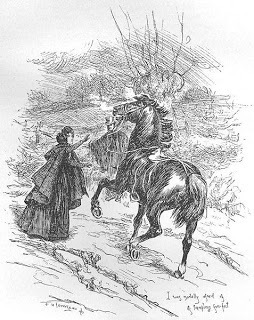
Jane meets Rochester
Over the years, some versions of Jane Eyre have emphasized the gothic horror of the novel, some the tormented Rochester, some the romance, some the proto-feminism, some the perfidy of the aristocratic class, some the oppression of the servants (with new servant characters created!) Each generation accentuated the theme that resonated most with the prevailing sensibility. Or perhaps each generation projected on Jane the meaning it wished. Like all great art, Jane Eyre has a thousand facets in which to see one's reflection.
Though it might come as a surprise, Jane Eyre was controversial when first published by "Currer Bell," as can be seen in the pages of Beaufort 1849. It is passages such as this that were startling in 1847:"It is in vain to say human beings ought to be satisfied with tranquility: they must have action; and they will make it if they cannot find it. . . . Women are supposed to be very calm generally: but women feel just as men feel; they need exercise for their faculties, and a field for their efforts as much as their brothers do; they suffer from too rigid a restraint, too absolute a stagnation, precisely as men would suffer; and it is narrow-minded in their more privileged fellow-creatures to say that they ought to confine themselves to making puddings and knitting stockings, to playing on the piano and embroidering bags. It is thoughtless to condemn them, or laugh at them, if they seek to do more or learn more than custom has pronounced necessary for their sex." (Ch 12)
In Beaufort 1849 Aunt Winnie sniffs this theme out in Jane Eyre before her fingers even touch the book, so of course she doesn't want her self-willed niece to read it. The last thing Cara needs is encouragement to exercise her faculties or escape from confinement. That she will receive exactly such encouragement from Jasper Wainwright is part of what makes Winnie instinctually dubious about him from the beginning.

Elizabeth Rigby--no fan of Jane
Aunt Winnie's misgivings reflect a wider strain of criticism of the time. Shortly after Jane Eyre appeared, Elizabeth Rigby, British author and art critic, laid into our poor Jane with a vengeance. "The impression she [the character, Jane] leaves on our mind is that of a decidedly vulgar-minded woman--one whom we should not care for as an acquaintance, whom we should not seek as a friend, whom we should not desire for a relation, and whom we should scrupulously avoid for a governess."
Ouch. And it gets worse. She accuses little Jane of being unworthy, uninteresting, pedantic, affected and unlovable. She calls her "an unregenerate and undisciplined spirit." And the very worst accusation: Jane Eyre is anti-Christian, fomenting class warfare and even revolution. "There is throughout it a murmuring against the comforts of the rich and against the privations of the poor, which, as far as each individual is concerned, is a murmuring against God's appointment--there is a proud and perpetual assertion of the rights of man, for which we find no authority either in God's word or in God's providence--there is that pervading tone of ungodly discontent which is at once the most prominent and the most subtle evil which the law and the pulpit, which all civilized society in fact, has at the present day to contend with. We do not hesitate to say that the tone of mind and thought which has overthrown authority and violated every code human and divine abroad, and fostered Chartism and rebellion at home, is the same which has also written Jane Eyre."
And so Elizabeth Rigby has put her finger on the element that endears the book most to me: Jane's assertion that she—small, plain and poor as she is—still has a right to be the center of her life, the heroine of her own story. She has the right not only to be "discontented" but to express the truth and object to what is unjust even if that means "murmuring against God's appointment." From childhood on, Jane demands to be treated with the consideration and respect due every single person on earth. That this was viewed as heretical, unchristian and subversive doesn't surprise me. "A proud and perpetual assertion of the rights of man" echoes the opening of Jefferson's Declaration of Independence, and I'm sure this wasn't a document Elizabeth Rigby was fond of either.
Here is Jane with Rochester, her conventional superior in every way (age, size, wealth, power, position, sex): "Do you think, because I am poor, obscure, plain, and little, I am soulless and heartless? You think wrong! — I have as much soul as you — and full as much heart! . . . . I am not talking to you now through the medium of custom, conventionalities, nor even of mortal flesh: it is my spirit that addresses your spirit; just as if both had passed through the grave, and we stood at God's feet, equal — as we are!" (Ch 23)
Jane is profoundly egalitarian in a society that was profoundly elitist. She asserts a worldview that was diametrically opposed to the power structure circumscribing her life. And yet it is her determined voice that echoes unwavering and insistent across a century and a half, while the armada of other, less vulgar books published at the time have sunk into obscurity. It's no wonder Charlotte Brontë's creation made Elizabeth Rigby uncomfortable: Jane Eyre challenged the very cornerstone of her civilization. I would say writing it was an act of great courage, although Brontë might not have considered it so. She might have just thought it necessary. She wrote in one of her letters: "Imagination is a strong, restless faculty, which claims to be heard and exercised . . . When she is eloquent, and speaks rapidly and urgently in our ear, are we not to write to her dictation?"

Charlotte Brontë
By the end of Brontë's short life (she died at thirty-eight) even though Jane Eyre was quite popular, she could have had no indication that her small, plain heroine had made any difference to class structure, political thought, or the course of history. Today British aristocratic privilege is almost eradicated from the earth, its power eviscerated through war and the impossibility of profiting indefinitely from endless empire. Elizabeth Rigby, while she rates an entry in Wikipedia, is remembered primarily for her criticism of Jane Eyre as an acute example of critical judgment blinded by cultural bias.
Martin Luther King said, "The arc of the moral universe is long but it bends towards justice." I hope this is true but I can't be certain. Clearly, however, history bends towards irony of an acerbic nature. I expect subversive Jane will keep popping up on our screens and stages (this outspoken orphan who will not flinch from the truth) as long as we pretend charity but offer little, as long as we create hierarchies of wealth and power that preclude human worth and dignity, as long as we hide our monsters in the attic and pretend they're not there. And we won't even know why Jane, in whatever guise—Gothic or feminist, Harlow or mouse—keeps materializing with her fierce indignation before us.
Perhaps justice is a dish best served poetic.
Published on August 30, 2011 18:48
August 12, 2011
Congrats to Beaufort, South Carolina on Their New Bicycle Amenities!
 I just read in the Beaufort Gazette (doesn't everyone peruse their website daily?) that the town of Beaufort is in the process of adding sharrows to some of their busier streets. In addition, they've recently installed ten bike racks at various places around town. Says Mayor Billy Keyserling:
I just read in the Beaufort Gazette (doesn't everyone peruse their website daily?) that the town of Beaufort is in the process of adding sharrows to some of their busier streets. In addition, they've recently installed ten bike racks at various places around town. Says Mayor Billy Keyserling:"Our goal is to make it comfortable and safe for people to move throughout Beaufort, whether they're on foot, in a car, on a bike, in a wheelchair, on a bus or riding a horse-drawn carriage. Roads need to be more than just thoroughfares for cars and trucks."
What an enlightened view.
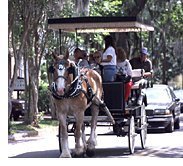 Though the downtown and historic districts are wonderful for walking, Beaufort is even more fabulous for bicycling. It's flat, and, except for a few roads, the traffic is calm and leisurely. (The horse-drawn carriages certainly help with this. You want to calm your town's traffic? Sprinkle a few carriages here and there and traffic drops to a nineteenth century pace before you can say Edgar Allan Poe.)
Though the downtown and historic districts are wonderful for walking, Beaufort is even more fabulous for bicycling. It's flat, and, except for a few roads, the traffic is calm and leisurely. (The horse-drawn carriages certainly help with this. You want to calm your town's traffic? Sprinkle a few carriages here and there and traffic drops to a nineteenth century pace before you can say Edgar Allan Poe.) I can't say I'm a big fan of sharrows, painted arrows on the road indicating that the lane is meant to be shared between cars and bicycles. On any road with a speed limit above 25mph, bike lanes are much better. That way bikes have their space, cars have theirs, and far less conflict is to be had by all. But at least sharrows remind drivers that bicycles may be present, and in that respect they are better than nothing.
I can't say I'm a big fan of sharrows, painted arrows on the road indicating that the lane is meant to be shared between cars and bicycles. On any road with a speed limit above 25mph, bike lanes are much better. That way bikes have their space, cars have theirs, and far less conflict is to be had by all. But at least sharrows remind drivers that bicycles may be present, and in that respect they are better than nothing.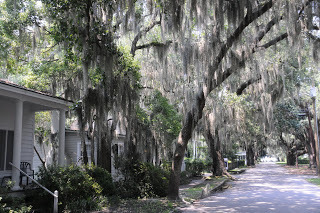 Here in San Francisco I've been a hardy urban bicyclist for the last three years. I bike or walk half my trips, including grocery shopping. I'd do even more if I weren't constantly shuttling teens around in carpools. But bicycling in San Francisco, while enjoyable and rewarding, is rarely a tranquil experience. Beaufort, on other hand, as one glides under moss hanging from oaks in the sleepy afternoon heat, offers a timeless, limpid serenity. Lovely. Though I have to admit I'd rather experience this serenity this in temperatures under 90 degrees than over.
Here in San Francisco I've been a hardy urban bicyclist for the last three years. I bike or walk half my trips, including grocery shopping. I'd do even more if I weren't constantly shuttling teens around in carpools. But bicycling in San Francisco, while enjoyable and rewarding, is rarely a tranquil experience. Beaufort, on other hand, as one glides under moss hanging from oaks in the sleepy afternoon heat, offers a timeless, limpid serenity. Lovely. Though I have to admit I'd rather experience this serenity this in temperatures under 90 degrees than over. Charleston is another great bicycling town with its own brand of bicycle chic, and Hilton Head offers some of the best physically-separated bicycle infrastructure in the country. They deserve their silver medal as one of the nation's top bicycle-friendly communities!
Charleston is another great bicycling town with its own brand of bicycle chic, and Hilton Head offers some of the best physically-separated bicycle infrastructure in the country. They deserve their silver medal as one of the nation's top bicycle-friendly communities!Bicycles are one of the most efficient machines human ingenuity has ever devised. If it weren't for the fact that they didn't appear in America until after the Civil War (although reports of something called a velocipede popped up in Scotland as early as 1839) and also for the fact that Beaufort's antebellum roads consisted mostly of sand lined with oyster shells--not the best bicycling surface before rubber tires came on the scene, although very pleasant for horses, I imagine--I might have tried to slip one into Beaufort 1849. Instead, the characters ride on horseback or in carriages, or, when they're in need of a constitutional, they walk. As proper antebellum characters should. Ah well. I can bicycle in Beaufort now.
Published on August 12, 2011 17:41
July 28, 2011
Beaufort 1849 Now Available on Kobo Books
Beaufort 1849 is now available as an ebook on Kobo Books. Kobo ebooks can be read on a Smartphone, desktop computer or tablet, or on a Kobo eReader.
Beaufort 1849 on Kobo Books
Beaufort 1849 on Kobo Books
Published on July 28, 2011 18:07



